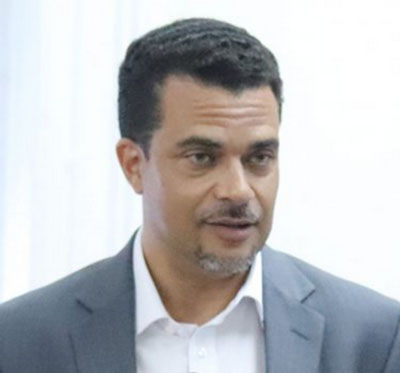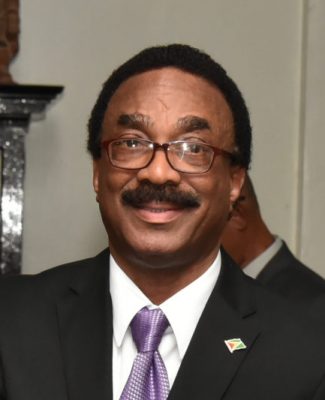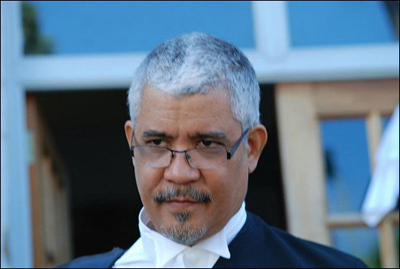Guyana’s Court of Appeal is set to rule on Thursday on the challenge brought by Misenga Jones to prevent the Guyana Elections Commission (GECOM) from using the results of the national recount of the votes cast at the March 2nd elections to declare a winner.
Following written submissions and five hours of arguments yesterday, the court is considering whether acting Chief Justice Roxane George-Wiltshire erred when she ruled that the constitutionality of Section 22 of the Election Laws (Amendment) Act, under which the recount was carried out, could not be addressed at this stage of the electoral process. Also being considered is whether GECOM is empowered to reject a report from the Chief Election Officer (CEO) Keith Lowenfield.
Lowenfield has over the last month consistently refused to submit a report on the polls using the results of the recount. Instead he has most recently submitted a reports using declarations from March 13, including a discredited declaration from Region Four Returning Officer Clairmont Mingo.

While the Commission by majority has refused this report, the CEO and the appellant have argued that the Commission cannot require that a different report be submitted.
The court, led by Justice Dawn Gregory, heard oral arguments form the more than 10 parties to the case.
Arguing that Jones is asking the Court “to aid and abet a series of illegalities,” attorney Kim Kyte-Thomas, appearing for GECOM Chair, Justice (ret’d) Claudette Singh, urged the court to dismiss the appeal.
“I ask the court not to be used as an instrument of fraud because that is what the appellant is asking… They have dressed it in legal language [but] all their contentions which attack specific pieces of legislation can be frontally addressed by an elections petition,” she noted.

Her arguments were supported by Timothy Jonas, who appeared on behalf of Josh Kanhai of The New Movement.
Jonas reminded that in the recent case of Ulita Moore, the applicant sought to argue that GECOM was bound by the declaration of Mingo and could not embark on a recount. He explained that the same argument seeking to bind the Commission to a fraudulent declaration from one of its employees is being used in this case.
“Any member of the public can challenge an illegality of an official of GECOM. Therefore, the argument cannot stand that the Commission must blindly accept what is known to be an erroneous, mistaken or fraudulent act by an official and pretend it never happened, therefore perpetrating knowingly an erroneous election,” he stressed, while adding that the court was being asked by the appellant to give it’s stamp of approval to a proven illegality contrary to every principle of law.
A similar contention was made Senior Counsel Ralph Ramkarran, who reminded that in 2011 the Commission acted to stop then CEO Gocool Boodhoo from making an erroneous declaration about the number of seats won by contesting parties. Ramkarran appears on behalf of Lenox Shuman, who represents the Liberty and Justice Party (LJP).

Free from interference
These arguments were, however, challenged by Attorney General Basil Williams, who is supporting Jones’ appeal. He told the court that the Chief Justice misinterpreted Article 177 (2) of the Constitution when she found that the CEO could not act on his own and did not hold a constitutional mandate.
The article provides that the Chair of the elections commission shall declare a President “acting only in accordance with the advice of the Chief Election Officer.”
According Williams, the meaning of the article makes it mandatory for the Commission to act on the advice of the CEO.
“It must be given plain meaning to arrive at true intent of the legislation,” he said of the Article before contending that the role of the CEO under the constitution must necessarily be separated from his day-to-day administrative function.
The AG sought to claim that while the CEO is subject to the direction and control of the Commission as an administrative officer, he must be free from influence when managing an election.
“Elections are to be seen as being free of interference, even the interference of the Commission, which is made up of politically-appointed commissioners,” he argued adding that Chair’s position in this case is purely formal.
Williams in presenting arguments for the substantive appeal appeared to agree with the appellant in most matters.
In fact he argued that both Section 18 and Section 22 of the Election Laws (Amendment) Act were unconstitutional. Section 18 establishes the CEO as an officer of the commission subject to its direction while Section 22 grants the commission the authority to amend electoral law.
Presenting the case for the appellant, Senior Counsel Mayo Robertson argued that the Chief Justice erred when she ruled that the matters raised in Jones’ application had already been addressed at higher courts and were therefore res judicata, thereby binding her to the decisions made by the higher courts.
While Jones had argued in her application that Section 22 of the Elections Laws (Amendment) Act, pursuant to which GECOM issued the recount order was unconstitutional, the Chief Justice underscored that this subject matter had already engaged the court’s attention and emphatically decided upon in the Moore case, where the Court of Appeal “clearly” held that the legality of Section 22 was “a matter to be frontally examined by the court at a full hearing,” that being in an elections petition.
Robertson stressed to the Appeal Court that the matter was being frontally examined right now in the current case.
He claimed that in the Moore appeal, the constitutionality of the section was raised but Justice Rishi Persaud, one of the judges hearing the current appeal, argued that since it was not raised first at the lower court it could not be raised as part of the appeal.
A frontal approach did not mean a trial with witnesses, he said, while explaining that the ruling does not suggest that a petition Court is the only venue where the matter could be addressed.
The CJ, Robertson contended, took impermissible liberty with the language of the Appeal Court.
Must act lawfully
Asked by Justice Gregory if she agreed with the High Court’s exercise of jurisdiction in the case, Kyte-Thomas said yes but contented that the jurisdiction is a very narrow one.
She explained that there must be a clear distinction between GECOM managing an electoral process and an elections dispute. She added that while the elections management process can be judicially reviewed during its execution, an elections dispute must be settled via elections petition. “The Court has a narrow supervisory discretion related to the impasse between the Chair and the CEO [which was exercised] in an attempt to ensure the elections process was completed in a timely manner,” she stressed.
According to the attorney, this same discretion was exercised by the same court in the 2001 case of Aubrey Norton vs GECOM and the 2020 case of Reaz Holladar. Additionally the Appeal Court also exercised this jurisdiction in the recent case of Moore.
She reminded that the Chief Justice has said that the court has the jurisdiction to ensure that a statutory officer complies with the provisions of the statute and maintained that GECOM also has the power to step in and ensure its officer acts lawfully. The CEO, it was stressed, is such an officer who is subject to the directions of the Commission.
“The CEO is not a constitutional office…he must act lawfully and in conformity with the laws of the land which right now include Order 60 [recount order],” Kyte-Thomas said.
The question of the court’s jurisdiction was also address by Kamal Ramkarran, who appeared on behalf of A New United Guyana (ANUG).
“A seminal question to be decided is what can a court do or not do in a case about elections before those elections are completed,” he noted, while explaining that various courts have already decided that their actions are limited to ensuring that the commission and its officers execute their statutory functions in keeping with the relevant legal provisions.
Similarly, Senior Counsel Douglas Mendes, appearing for Bharrat Jagdeo and Irfaan Ali, who represent the People’s Progressive Party/Civic (PPP/C), contended that the High Court does have jurisdiction to intervene before an election is declared but only to the extent to correct or smoothen the progress of the election proceeding in a supervisory capacity.
The court, he stressed, cannot determine the validity of the election itself before its conclusion.
“It is an important part of elections law that challenges to an election must be brought after an election is declared and not before…that principle is inconsistent with a court intervening to question anything the Commission has done,” he stressed, while adding that the current case is a direct challenge to the validity of the elections and must be examined via elections petition.
Mendes, however, argued that CJ George erred in finding that in the exercise of her limited jurisdiction she was entitled to interpret the constitutionality of the Order 60, Section 22 of the Election Laws (Amendment) Act as well as Article 177, to determine whether the CEO, Chairperson and the Commission were acting lawfully.
Apart from Justices Gregory and Persaud, Justice Priya Sewnarine-Beharry is also hearing the case.






